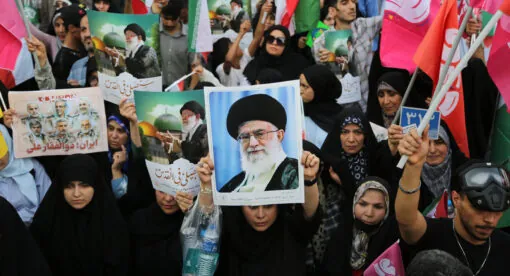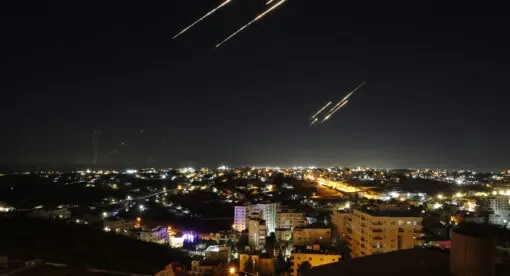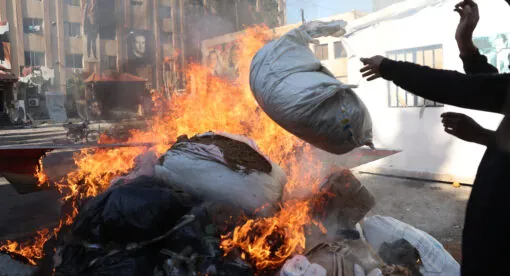In the latest Contours episode, host Carolyn Moorman explores the ramifications of former Wagner leader Yevgeny Prigozhin’s death on the group’s activities in Africa and Russian internal stability with Senior Analyst Riley Moeder and Non-Resident Fellow Jeff Hawn.
Carolyn Moorman:
Hello and welcome to the New Lines Institute for Strategy and Policy’s Contours Podcast. This is your host, Carolyn Moorman. On August 23rd, Yevgeny Prigozhin’s plane went down near Moscow. This is about two months after a failed armed insurrection led by Wagner leader Prigozhin and also Wagner fighters, which we covered in a previous episode of Contours with one of today’s guests, non-resident fellow Jeff Hawn. In this episode, we’ll be looking over the past two months of what Wagner and Prigozhin have been up to and differences in how the Wagner Group operates abroad and also internal Russian dynamics before the insurrection, after the insurrection, and now that Prigozhin is presumed to be dead. Before we begin, a little bit about our guests, Riley Moeder is a Senior Analyst for Special Initiatives at New Lines leading the Transnational Fragility Initiative with a focus on Africa. Prior to joining the institute, Riley worked for the US Institute of Peace in the Middle East and North Africa department.
She previously worked at the American Enterprise Institute’s Critical Threats Project researching non-state actors in the Sahel. She also studied in Strasbourg, France, where she specialized in international and human rights law and refugee policy. Also joining us is Jeff Hawn. Jeff is a non-resident fellow at New Lines and a doctoral candidate within the Department of International History at the London School of Economics. Jeff’s research focuses on the aftermath of the Cold War and the emergence of modern Russia. Before undertaking his doctoral studies, Jeff previously worked as a private sector tactical intelligence analyst and has written extensively on Russia’s domestic politics and foreign policy. Thank you so much for being here, Riley and Jeff. I’d like to start with this period after the insurrection and before the death of Prigozhin. Jeff, can you walk me through your assessment of the June insurrection led by Prigozhin? What was the aim of this? Was it successful in meeting this aim? How did it end, et cetera?
Jeff Hawn:
Thank you, Carolyn. Well, I’m going to reference my colleague Julian Waller at George Washington, who I think coined the best way to frame this. It’s been called a mutiny. It’s been called a revolt, but actually what we think it is best described as is a Baron’s Revolt. And what that means is Prigozhin was a major actor within Russian domestic politics, but he was someone who was directly reliant on Putin for patronage. And this put him into direct competition with other actors within the Russian state institutions, because Russia does not function in a formal top-down manner as is often perceived abroad. Rather, you have a number of interest groups both nominally public and private that compete with one another. And each of these interest groups have their own patronage networks. Prigozhin is unusual in that he was largely outside of the established networks, due primarily to his background as a criminal rather than someone who was educated at the higher end of the former Soviet Union the way Putin was, or someone with a long record of public service like Defense Minister Shoigu, who became Prigozhin’s main rival.
The Baron’s Revolt started when Prigozhin came into increasing conflict with the Ministry of Defense in Ukraine, because the Ministry of Defense was curtailing the Wagner Group’s ability to resupply, support itself and in more than one occasion, it seems, instigated a green-on-green incident, which is to say a friendly fire incident, which killed Wagner members. Prigozhin finally lost his temper, seized Rostov-on-Don, which was the central headquarters and coordinating center, as well as the logistics hub for the Russian operations in Donetsk, Ukraine, and proceeded to drive towards Moscow with the stated objective of removing the defense minister and the chief of the general staff. Now, this ended rather abruptly in what we believe was a negotiated climb down, supposedly brokered by the Belarusian President Lukashenko, and there might have been some guarantees of safety. There might have been some agreements reached, but these would’ve been purely verbal agreements.
And supposedly what it looked like was going to happen was the Wagner Group and Prigozhin, in particular, were going to go into exile outside of Russia, Belarus specifically, where Lukashenko had agreed to provide them safe haven, and they would keep most of their light armaments but turn over their heavy arms, which included but not limited to several trucks, anti-aircraft systems, and a main battle tank that they somehow got their hands on. And they would continue their overseas operations, but their assets and operations within Ukraine would instead be absorbed into the Ministry of Defense. And that’s basically a summary of what happened in June.
Carolyn Moorman:
After this insurrection or this Baron’s Revolt as Jeff called it, a lot of the world was watching to see if this was going to have any effect on what Wagner does globally. As we know, they’re active in Ukraine, they’re active in Syria, they have been in the past, but right now they’re very, very active in multiple African countries. Riley, you’ve been following this very closely and a lot of analysts are worried that after this insurrection, this was going to kind of reformat how Wagner is engaging within Africa and the countries it is involved. Did you ever share these concerns?
Riley Moeder:
Thanks, Carolyn. It’s always a pleasure to be here with you. Quite honestly, no, I don’t share these concerns. Wagner’s not the first Russian PMC to operate in Africa or the Middle East. Its predecessor Moran Security Services was active in Sudan as early as 2010 operating one of their largest gold mines. Any kind of restructuring or consolidation of power after a coup such as we saw earlier this summer is not likely to have any significant negative impacts on operations.
I think it’s important to note that Wagner’s control varies from country to country. The man in charge in Mali is not necessarily the man in charge for Central African Republic, and there is no traditional playbook. They just kind of show up and figure it out. And with that, having a centralized power in Russia or in the UAE, or in Europe is not something that’s ever going to operate well or function well with Wagner. I actually think we might see an uptick in operational capacity as Wagner elites attempt to recoup both financial and personnel losses they sustained in the ongoing war in Ukraine. It’s estimated that Wagner has lost up to 50,000 troops in the war in Ukraine and millions in revenue.
Carolyn Moorman:
And so with this in mind and after this Baron’s Revolt to use Jeff’s term again, Jeff, what can you tell us about what Prigozhin was up to in this two-month period in between the insurrection and his death? Was he trying to rebuild legitimacy with some of these African countries? Was he planning contingency plans? A lot of people that are familiar with Russian history, a lot of people were making snide comments, even President Biden, about Prigozhin needing to watch his back because something bad could happen to him. Do you think Prigozhin was kind of looking over his shoulder in this period or just going about business as usual in this new kind of post-insurrection situation?
Jeff Hawn:
Well, Carolyn, it’s very hard to say. We can speculate obviously based on the available evidence. At one point I did joke that Prigozhin sightings have become the Slavic studies version of Where’s Waldo because he seemed to be popping up everywhere. He appeared on a video supposedly from the Wagner camp in Belarus, but then he later popped up at the St. Petersburg Africa Forum, so he seemed to be going all over the place. At the time we know that the state was deconstructing his operations and assets within Russia. As Riley rightfully noted, it’s unlikely that this change would have a long-term impact on the operations of Russian PMCs or Wagner, whatever they’re going to call themselves. But it certainly was having an impact on Prigozhin, and it’s unclear what he was trying to do, but he certainly felt bold enough to travel into and out of Russia.
It’s worth noting that many people were commenting about how he should be looking over his shoulder. But this is a man who started his career during the 1990s in St. Petersburg, when assassination was a common tactic both in organized crime and what we would think of as legitimate business as well as government contract negotiations. So he had been looking over his shoulders since the 1990s and might have felt complacent. It is interesting the manner of his alleged death, which involved, at least according to Bellingcat’s investigation, some sort of sudden accident with the aircraft he was on. It was a very dramatic form of assassination. So it’s likely he was taking precautions which precluded a quieter or less dramatic death, unless there was a deliberate effort to make an example out of him. But as to what his long-term plans were, we really have no idea and we likely will never know at this point.
Carolyn Moorman:
So you mentioned, Jeff, Bellingcat’s investigation into the death of Prigozhin, and we even saw the Kremlin come out a couple of days ago and say the plane may have been downed on purpose. What do you actually think happened? Do you think it’s a fair estimate for people to assume that the Kremlin was behind this? And with that logic, what do you think the Kremlin was trying to do with assassinating Prigozhin or getting rid of him? Do you think they were just trying to remove this annoying leader and continue to reap the benefits that Wagner’s exploits in Africa and globally give the Kremlin?
Jeff Hawn:
So again, we’re going to have to speculate, but based on the available evidence, it does appear that the plane was downed deliberately, possibly by a surface-to-air missile or some sort of explosive device placed on the plane. The Bellingcat data shows the flight recorder, everything was going fine until there was a sudden drop. And the video supposedly showing the plane crashing certainly indicates some sort of serious structural trauma as it literally falls from the sky. Some people have argued that there’s evidence of a missile contrail, but it’s also possible that it could have just been cloud cover. So it is interesting though that a plane crash was the manner chosen for eliminating him, because if we recall during the mutiny, the Russian Air Force did suffer a number of casualties. At least three helicopters and a very valuable command and control plane were shot down by Wagner fighters.
So the fact that the commander of the Aerospace Forces, who was a Prigozhin ally who’s not been seen since the mutiny, was removed the same day that Prigozhin’s plane fell out of the sky, is a very significant coincidence. And another coincidence from a historical perspective is the death was on the anniversary of the end of the 1991 August coup, which wrapped up on the 22nd of August, but the 23rd is generally observed as the end date because it’s when Gorbachev returned to Moscow and gave his speech and those who had tried to overthrow the established order were essentially dealt with. It’s interesting to note though, if we’re going to pick on that thread though, that the Putin regime has used violence, certainly has used violence, but it’s always been very opaque and it’s always been the byproduct of factional infighting where there’s been a lot of upset and anger by the regime for very prominent political killings.
Former Prime Minister Boris Nemtsov, who was most likely assassinated by the Ramzan Kadyrov family for an unknown and probably unknowable reason, caused a significant backlash from the Kremlin against the Kadyrovs. The fact that the regime did not openly murder Prigozhin but still has essentially not actively denied being behind it shows that there certainly is a change in the regime’s comportment. And I think this is symptomatic of a broader change in how the regime has been behaving since at least 2021. Many of us, myself included, many of us Russia analysts argued that launching a full-scale attack on Ukraine in 2022 was going to be a disaster for Putin for a variety of factors. And it was, however he still did it, and that was against what we had previously read to be his character, which was someone who acted in a high manner of restraint and realism, but he seems to be behaving more impulsively and more viciously.
It’s unclear if the assassination was directly ordered. Putin’s statement about this is what happens to traitors or something to that effect certainly seems to hint at the fact that Putin at the very least approved of it. In the past, though the regime has conducted these assassinations by signaling that it’s acceptable for a certain person to be eliminated. The specific instance that’s been communicated to me is Putin will say, “I don’t care about this person.” His lieutenants will take that as a sign that it’s safe to move against them. We think most likely the person driving behind the assassination was actually Defense Minister Shoigu, for whom Prigozhin was a much bigger threat than Putin himself, as Shoigu is the long-serving defense minister and essentially controls the Ministry of Defense bureaucracy, the same bureaucracy which is trying very hard to assert control over Wagner’s operations both within Russia and abroad, either directly or by proxy.
And by proxy, I mean putting people who have relationships or loyalty to people within the military who might not actively be in the military themselves, retired or former service, in positions of command and control in Wagner assets. We don’t know how that’s going to play out. And as my colleague Yako Fagan noted, the military bureaucracy’s very inflexible and unimaginative and almost completely devoid of initiative.
So we don’t know what the long-term endpoint of this will be, but it certainly shows an internal realignment in the regime and sets an example to other would-be pretenders, other would-be unhappy barons, and once more asserts the state’s primacy over non-state actors, even those who are affiliated with the Russian regime, because this has always been a key point of Putin’s regime, the primacy of the state above all else. We all remember when he first came to power, his first major campaign was to “Tame the oligarchs by reasserting the authority of the state,” making it clear to the oligarchs that they answer to the state, the state did not answer to them, and this is just a much more violent and sudden re-assertment of that same dynamic.
Carolyn Moorman:
And so I think with that it’s a good point to transfer over to looking once again at Wagner’s activities abroad in Africa. Riley, in your previous answer you stated that you didn’t think Wagner’s activities would change that significantly after the insurrection. Does this death, his assassination, if we can call it that, change this calculus, and do you foresee in the future Wagner becoming more decentralized now that Prigozhin is dead? Or do you see, as Jeff mentioned in his answer just now, do you see this as a chance for the military bureaucracy to replace Prigozhin with someone potentially closer to the Kremlin and easier to control? What do you see next for Wagner with this?
Riley Moeder:
Thanks, Carolyn. Again, a very timely question. So I think a lot of this, as Jeff put, is still very much still up in the air. We’re not going to have a definitive answer on this podcast and maybe not in the next few weeks. I think a key point of this though is that Wagner’s success as a form of Russian foreign policy, is their ability to work outside the official state. And through that, they’re provided deniability by the Russian government. So basically we’ve talked in previous podcasts about the kind of cycle of abuse that Wagner’s created in countries like Mali and the Central African Republic, where they enter a country under the pretenses of security support, counter-terrorism missions. However, then actively target civilians, which encourages more rebellions and active Islamic insurgencies, which then creates a reason for Wagner to continue their employment. That has always been denied by the Russian government.
They have never actively claimed that Wagner is acting on Russian authority and that is a key component that they would like to maintain. So looking at if there’s going to be a choice, there’s been quite a few names thrown out, one of them was a former defense minister, to replace Prigozhin. That may be so, and Putin may be trying to align somebody at the head of Wagner who is more aligned and less confrontational with the Russian state.
However, I don’t see him fully taking Wagner into the official state capacity of the Russian government. Further to that, any kind of decentralization may happen, it may not happen. I think if we are to see a decentralization, it’s going to be purely because of the vast nature of their activities in Africa. They are involved in everything from counter-terrorism missions to political support to mining of natural resources. It’s very difficult to try to centralize any of that. So yeah, I think it’s up in the air and I think it’s kind of a stay-tuned situation. However, I don’t see the model in which Wagner has created in Africa changing anything for future PMCs or iterations of Wagner’s operations.
Carolyn Moorman:
So with that in mind, I’d like to follow up with that response Riley, and ask what ramifications you see this kind of situation having on African countries currently deploying Wagner, and what options do the US government and the international community have to not only get Wagner out of these countries and out of their role of destabilizing the African continent, but also to kind of rebuild the stability of these countries that are employing Wagner so they no longer feel the need to invite this group into their countries.
Riley Moeder:
Yeah, unfortunately, that is the question on every policymaker’s mind right now. So let’s break this question down a little bit. Essentially we’ve established that we think it’s going to be business as usual for Wagner in Africa, and any kind of decentralization may or may not occur, it may or may not go away. Russian PMCs and the future of Wagner are going to continue in preexisting structures that carry out illicit activities. So looking at this model, I think there’s two ways that the United States can tackle this. One, stop using sanctions. Sanctions are not working. The Russian PMCs, Wagner and any future or former iterations, operate with extensive shell company networks. Right now, I think there’s on the list about 64 shell companies that Wagner is affiliated with or directly tied to, and that doesn’t even include the ones that the US government hasn’t tracked. So what this whack-a-mole model of sanctions of sanctioning, say Dynacor in the Central African Republic, or Midas, also a mining company, just means that they’re going to pop up another shell company, funnel funds back that way.
The United States needs to take a firmer hand in where these funds are going to, they’re being circulated in the United Arab Emirates, they’re going into Western Europe. And one way to do that, and Jeff Hawn and I actually consulted on this policy recommendation thoroughly before drafting an outcoming report, is to rewrite the United States American Racketeering Act to target individuals and companies who are actively financing and exploiting resources from Africa. RICOs in the past has had some success with FIFA when FIFA went a little haywire earlier in 2015, 2016, has the ability to go after larger individuals at play. I also think that the US government needs to put some heavier pressure on some of our allies that are allowing these funds to pass through their own banks, the UAE in particular. That would be a really great place to start. Additionally, I think we need to work on capacity building.
We need to find solutions for these countries besides sanctioning them, besides outlawing Wagner, besides labeling them a foreign terrorist organization, because that creates ripple effects which create power vacuums, which causes malign actors to fill them, such as Russia and China. We need to address the root cause for why these countries are turning to them, to begin with. And one of those reasons is their accessibility, their ease of operational capacity. There’s not moral baggage that comes with them, and I know that we don’t want to set the bar so low that we’re actively supporting autocratic regimes, but if we are invested in these people and in proper democratic governance, we need to start supporting education reforms, DDR, demobilization, deradicalization and reintegration processes, good finance, economic development and processes that are sustainable and not just an inject a foreign direct investment and then pull out.
Lastly, I know I’ve been on a little bit of a soapbox rant here. I think we need to start holding our European allies responsible for their activities in Africa, specifically looking at the French. The French have historically been involved in a lot of these countries providing counter-terrorism support, and due to increasing pressure and political, domestically and internationally, they have began pulling out of Africa. We saw them pull out of Mali, they’ve pulled out of the Central African Republic, and they are pulling their investments both private and government. So an option there is encourage the French government to stick it out. When they pull out, they take all of their toys with them, and that’s something that’s causing, again, a vacuum and a space to be filled by malign actors. Not to call out the French too harshly. I do love the French.
Carolyn Moorman:
I’m sure the French love New Lines Institute as well. Thank you Riley for your really wonderful answer. And I think I speak for all of the listeners that were very excited to read this report that you mentioned when it does come out and hear more about what the US and the international community can do to counter Wagner and to work on capacity building in these African countries.
Jeff, I want to direct this final question to you and talk about the Russian state itself and how this insurrection, this Baron’s Revolt, as you called it earlier, and now Prigozhin’s death will be affecting Russia internally, and the global view of the Kremlin itself. In the episode that we did of Contours right after the insurrection, Jeff, you said this: “Putin’s infallibility has been called into question for the first time in a long time.” Do you think Prigozhin’s death, whether Putin called for it or just said he didn’t care if it happened, can be viewed sort of as an acknowledgment of the role and power of Prigozhin that he displayed in undermining Russian stability as you alluded to earlier, or just as a more simple act of revenge? How do you think this death of Prigozhin should be viewed globally?
Jeff Hawn:
I think that it is an attempted consolidation by an increasingly fragile state. Prigozhin’s activities did show the fragility of the Putin system, and it also showed Putin’s lack of infallibility. The broader elite networks have largely isolated themselves from the war in Ukraine, outside general performative or substantive contributions in term of economics or for a lot of the regional governors, there’s a real pressure to find more bodies to put into uniform. But by and large things in Russia have been moving along in a very bizarre state where the country does not feel like it’s at war, and the elite circles have largely been able to deal with the new reality. But Prigozhin’s activity illustrates just how fragile that reality is, and it begs the question of how the system will function when Putin does inevitably go, or if someone else will come along and be more successful in pushing him out.
Because all of this is centered around Putin’s personality, because he remains the supreme arbiter of the elite power networks, and as was illustrated by Prigozhin’s revolt and subsequent assassination, possibly by his political rivals in other elite power networks. When Putin goes and is no longer able to arbitrate, it’s likely that we’ll see a return to the 1990s, when the competition between these circles grew increasingly violent and increasingly direct. Granted, we never had anything close to full-scale civil war if you set aside the 1994 First Chechen War and the 1993 constitutional crisis as outliers, but the language of negotiation in the 1990s was violence between elite circles, and one of the things Putin largely solved was reasserting the role of the state as a neutral arbiter, but also empowering the state patronage networks to maintain that tradition of heavy centralization. So I think Prigozhin’s death just further shows Putin’s lack of infallibility.
I think it shows the increasing fragility of the Russian state, and I think it will not take much one way or another for that state to start to shatter and the veneer of stability and order that it’s currently existing under to come crashing down. We will see what the long-term outcome is. There’s many developments which are worth watching. Russia has local elections coming up and in several places, unless there is more blatant fraud than we’ve seen in a very long time, there looks to be a number of outside candidates who are going to try to challenge local elite networks. My colleague, Leyla Latypova from the Moscow Times wrote a very interesting article on this that just came out a few days ago. And more interestingly, as the war has gone on and the central government has increasingly run short of resources, it’s touched off greater competition between elite networks, the security services, the National Guard, the military, but also subnational elite networks, and the Russian state has had to devolve power to these subnational networks.
Now, after the mutiny, parliament passed a law that allowed local governors to raise their own private military formations to help with the war effort or to help with local security. On the one hand, that’s a pretty logical decision, because it increases the ability of local elites to ensure their own security and contribute to the war effort. On the other hand, though, it’s a pretty major acknowledgment of the fact that the Russian state is going to have to renegotiate its relationship with the periphery and essentially give license to create more private militias, not less. I doubt we’ll see any get to the same size or heft as what the Wagnerites got to.
And certainly, the Ministry of Defense is trying to have a monopoly. Yeah, Prigozhin’s life and death is illustrative of the Putin regime, because as Putin admitted, he and Prigozhin had known each other since the very beginning of the new Russia in the 1990s, and in many ways, they are two sides of the same coin of how that new Russia evolved. The violent criminal entrepreneur and the former security man who was in many ways a violent political entrepreneur. And now Prigozhin is gone most likely, I’m going to say there’s a 99% chance, and Putin is still there, but for how much longer? And then the question becomes, what comes next for Russia and for the region and for the world? And that is a question I’m trying very hard to answer, but it is very difficult at this point. So I’ll get back to you on that.
Carolyn Moorman:
Yes, please do get back to us. I’m sure the whole world will be very curious to see what comes next after Putin. And as you mentioned, these elections and what they bring for Russia and its internal dynamics with the patronage networks that are very important to the state. I want to thank both Jeff and Riley for appearing on the episode today. To our listeners, thank you for listening to this episode of Contours. You can check out further analysis into geopolitics and US foreign policy at www.newlinesinstitute.org. All the best.







